Matthew 25:14 – For it will be like a man going on a journey, who called his servants and entrusted to them his property.
In the prior parable of the 10 virgins, Jesus was warning us to be watchful and ever mindful of his coming. He is going to come back unexpectedly, and we need to be ready.
This parable, commonly referred to as the parable of the talents, tells us how Jesus will deal with men upon his return. In light of this, we can understand how a wise follower of Christ should live his/her life.
I am sure that you have already identified the main characters of the parable. The 'man' or owner/master is Jesus. Notice that he is going on a journey. This refers to the period of time that we call the gospel dispensation or the kingdom of heaven. When Jesus left the apostles to go and sit at the right hand of the Father, he 'went on a journey'. In the end of the parable, he will return once more. This refers to the end of time, when Jesus will come again for the church.
This period of time is the same time referred to in the prior parable when the bridegroom tarried or was delayed in his coming.
In the current parable servants are exactly that – true followers of Christ. As his servants, Jesus has entrusted or given them authority over a portion of his property. What does that refer to?
Back in the day when Jesus told this parable, there were two ways for an absent owner to invest his money/goods.
First, he could give his servants authority on his behalf, making them his agents. They would till the land and sell the produce or they could use his money as capital in trading. Although there was no written contract (they were servants/slaves), there was always an implied understanding that these servants would receive part of the profits.
The second opportunity, which was in full operation throughout the Roman Empire, was to take advantage of money lending. The Phoenicians are credited with inventing this investment banking system. It is still used in our society today. The bankers would receive money on deposit and pay interest on it, then turn around and lend it to someone else at a higher interest rate. So a person who did not have the time or inclination to farm or trade could still invest and make some money.
Matthew 25:15 – To one he gave five talents, to another two, to another one, to each according to his ability. Then he went away.
Let's examine the word 'talent'. You could have a talent of silver, or a talent of gold. A talent is both a measure of weight and a denomination of money. To make matters more confusing (at least from my point of view), during the time of Christ the Jews used two different currencies in daily life. They had the Hebrew system of money, which was based on the shekel, and they had the Greek system of money which was favored by Rome and based on drachmas.
Of course, we are curious to know how much that is worth in our day. Because the price of precious metals is always fluctuating, it is difficult to determine exactly how much a talent is worth today. According to one internet source, the modern value of a talent of silver in July 2020 was worth $6,606 dollars and a talent of gold was worth $385,350.
If you search the internet, you will find slightly differing answers to this question. But the real point to be made here, is that a talent is not a tiny amount of money.
Based on the figure we are using, one of the servants in this parable was given $1,156,050 and another was given just shy of 2 million. 
Right away we can discern two things: The owner is very, very wealthy. And, more importantly from the perspective of our study, he has entrusted a great deal to his servants.
'Talent' is not only defined as a unit of weight/money. According to Webster's dictionary, it also means "ability, mental endowment or capacity, skill in accomplishing something, a special gift".
These talents or gifts are given to us by God:
Ephesians 4:8 – Therefore it says, "When he ascended on high he led a host of captives, and he gave gifts to men."
So each Christian has been given talents or gifts by Jesus. Our gifts can take on any shape or form. We may have a talent for singing, or selling goods, or playing a sport, or making scientific discoveries. The list is endless. God desires each one of us to use the talents/gifts he has given us to the full.
Sometimes Christians want to limit our talents and abilities to the spread of the gospel, but I do not believe that is the case. God has given people abilities in every single aspect of life, and he wants us to use them. You can serve and glorify God in the midst of creating art. You can serve and glorify God in the midst of running a business. You can serve and glorify God while being an astronaut or making medical breakthroughs. The key is to be faithful in the use of your gifts, as we will discuss later.
Now, we can't help but notice from verse 15 that not everyone receives equal talents. Some talents have more influence or power; some have less. We can plainly see that from everyday life. What can we infer from that?
Well, let's first examine what it does NOT say.
- Nowhere in this parable (or in the whole of the scriptures) does it ever say that God loves those least to whom he gives the least. In other words, He loves each one of us completely, 100%, right here, right now. He loves us perfectly. His love is not a function of how big our gifts are.
- The scriptures never portray God as being capricious (given to sudden and unaccountable changes of mood or behavior; fickle, unstable). In fact, the opposite is true. God never changes (Malachi 3:6). So God knew exactly what he was doing when he assigned one of his children 1 talent and another 5 talents. His decision is not based on whim, but on the perfect plan that he already designed for each one of us.
- There is no indication that this differential lasts beyond our present life. The talents are for use here on earth; none of us knows what God has in store for us in heaven.
- No one is without a talent. As we previously showed, even one talent is a considerable sum.
Why different amounts then? God is going to give us the amount of gifting/talents needed to accomplish his will on earth. If given more than needed, we would have a tendency to boast of our own accomplishments. If given less than needed, we would fail at our task. We have just enough to keep us in direct connection to God, so that we can complete the task at hand, giving the glory to him alone. We have each been given the perfect amount.
Matthew 25:16-17 – He who had received the five talents went at once and traded with them, and he made five talents more. So also he who had the two talents made two talents more.
We have looked at the distribution of talents given to the servants by their master. Now we will consider the servants use of the talents/gifts they were given.
In both of these cases, we find the servants 'traded'. This is indicative of activity and labor. They used their talents. No doubt, they made mistakes. But they did not give up. They continued to be faithful in investing what they had.
They learned from their actions, and then made more trades, based on an increased level of knowledge and experience. In so doing, they gained even more wisdom and understanding of their gift, and how to effectively use it.
Now they can anticipate what might happen next. They can spot subtle nuances that others would miss. They avoid common mistakes. They increase their skill, apply what they have learned and soon these two servants doubled their talents.
For instance, let's suppose you have a gift for woodworking. You decide to make a coffee table. Your first table probably has some flaws. Maybe the finish isn't quite perfect or the legs are slightly crooked. So you take note of your mistakes, and make another table. Each table you make adds to your knowledge and wisdom in woodworking. Before long, you can look at a piece of wood and know whether or not it is suitable for a table. You are able to make more intricate designs and fill custom orders. Soon, you are selling as many tables as you can make.
Because you actively and faithfully used your talent, it grew. You prospered in your task. As more and more people admire your work, you have a chance to share the gospel and/or live a righteous life before men. You have a chance to glorify God through your talent. The influence you have as a result of being a master craftsman can be used to share the gospel message. This is how the servants of the master doubled their money.
Matthew 25:18 – But he who had received the one talent went and dug in the ground and hid his master's money.
Here is an interesting thought – no one can take our talents/gifts from us. Paul says it this way:
Romans 11:29 – For the gifts and the calling of God are irrevocable.
Although no one else can take your talent/gift from you, you can choose to neglect it, or as the servant in the parable, bury it. How does one neglect a talent/gift? By allowing opportunities to use it pass you by; by leaving undone things that you have the ability to do.
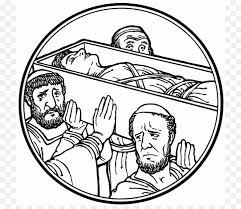
Why would anyone bury their talent?
- He/she may believe that they couldn't accomplish much with one talent anyway, so why bother? This rationalization does not come from God. As we already noted, God gives different qualifications in different degrees to different individuals, in order that each person might fulfill the unique mission He has prepared for them. So the idea that 'not much' can be accomplished with one talent is a lie.
- He/she may be comparing their talents to the talents of others. Sometimes the enemy will try and get us to compare ourselves to other believers. He will point out that other Christians have more faith than you, or more eloquence than you, or more wisdom that you, etc. If Satan can get you to do a comparison, it is then easy to convince you to be envious of what someone else possesses or to make you dissatisfied with what God has given you. Both of these convictions will cause you to bury your own talent.
- He/she may be afraid of failure. There is no question that fear is one of the main tactics of our enemy. Satan uses fear to immobilize us or stop us from carrying out God's will. Over and over and over in the scriptures God instructs his children NOT to fear, but to have faith in him. If we listen to Satan instead of God, we will bury our talent because of fear.
Matthew 25:19 – Now after a long time the master of those servants came and settled accounts with them.
Eventually, a day of reckoning will come. If you think about it, this makes perfect sense.
Jesus is the head of the Christian economy. In that exalted capacity, he has given various extremely valuable talents/gifts to his servants to steward for Him. The expectation has always been that his servants will use these talents to glorify Him, to do the world good and to further his kingdom on earth. Naturally, a period will arrive when he will come to demand an accounting.
Romans 14:12 – So then each of us will give an account of himself to God.
The accounting that is to come will be personal. I will not answer for you, nor will you answer for me.
Are you ready for the books to be opened and examined? One of the purposes of this parable is to get you to answer this very question. If you are not ready to give an accounting of your stewardship, then you need to make immediate changes in your life (immediate as in TODAY, RIGHT NOW, THIS VERY MINUTE).
Matthew 25:20 – And he who had received the five talents came forward, bringing five talents more, saying, 'Master, you delivered to me five talents; here I have made five talents more.'
The result of the proper use of our talents and gifts is that they will grow and bless others. They will glorify God, do good to mankind and bring others into the kingdom of heaven. The results of faithfully using our talents are reckoned in the imagery of the parable as gaining more talents.
We find that the faithful steward rightly acknowledges that all he had (his talents/gifts) had come from his master and that it was his duty and pleasure to gain an increase in talents for his master's benefit. The long delay had not made him careless or negligent; rather he had used the time profitably and he was able to lay an increase at his master's feet. He has no need to be ashamed when the time of reckoning comes.
Matthew 25:21 – His master said to him, 'Well done, good and faithful servant. You have been faithful over a little; I will set you over much. Enter into the joy of your master.'
The master praises his servant:
He is praised for being good - He was kind and merciful and honest in using his gifts. He did not selfishly use the gifts only on himself, but he used them for the benefit of others.
He is praised for being faithful - He was not idle or inactive, but steadily and continuously he labored for the expansion and good of his master's kingdom.
The master rewards his servant:
The servant goes from being a slave to a position of authority. He is promoted to greater honors and more important tasks.
The servant is invited to share the pleasures and enjoyments of the master's palace. He is to sit down and join in the rejoicing over the event of his master's return.
As faithful Christians who steadily and continuously labor for our Heavenly Father, we can joyfully anticipate being rewarded by God for our work here on earth.
Here is something to consider: The sum originally entrusted to this servant (nearly 2 million dollars) was a considerable amount in itself, but it was actually very small when compared with the vast wealth of his master.
Likewise, our work for God here on earth will be rather small compared to the vast reward that God has planned for his faithful earthly stewards. There can be no doubt that God is a generous employer!
Matthew 25:22-23 – And he also who had the two talents came forward, saying, 'Master, you delivered to me two talents; here I have made two talents more.' His master said to him, 'Well done, good and faithful servant. You have been faithful over a little; I will set you over much. Enter into the joy of your master.'
This servant's work is acknowledged, praised and rewarded in exactly the same manner as the first servant. The reward is dependent upon faithfulness, not greatness.
Matthew 25:24-25 – He also who had received the one talent came forward, saying, 'Master, I knew you to be a hard man, reaping where you did not sow, and gathering where you scattered no seed, so I was afraid, and I went and hid your talent in the ground. Here you have what is yours.'
And now we come to the servant who chose to bury his talent. He has seen the first two servants be praised and rewarded. He understands that he too, will give an account of his stewardship over the one talent. He knows that his service has been unsatisfactory; he is left without an explanation and must rely on an excuse for his inaction.
His excuse is based on the fact that the original talent has not been lost. His assumption is that while he might not enjoy the praise of his master, he will at least be safe from punishment.
In his estimation, he is going to 'pass muster' because he is not a liar or a murder, or an atheist, or an adulterer, etc. He seems to think that just good works will gain him entrance into an eternity with his master. He is completely unconcerned about wasting his talent. In fact, he readily admits that he hid the talent he was given to steward. In his mind, he did no wrong by putting it in a safe place and taking no risks with it.
 He then turns his attention from himself to the 'unfair' character of his master. He chooses to see his master (God) as harsh, stern and churlish, without love or compassion, who sets men up to fail and makes no allowances for imperfect service. As if this were not bad enough, he attempts to pass off his claims as 'knowledge' of God.
He then turns his attention from himself to the 'unfair' character of his master. He chooses to see his master (God) as harsh, stern and churlish, without love or compassion, who sets men up to fail and makes no allowances for imperfect service. As if this were not bad enough, he attempts to pass off his claims as 'knowledge' of God.
How sad! Even a slight understanding of God reveals his love to mankind. What greater love could Jesus have displayed than dying to save us? That love should motivate us to be diligent and faithful to shine our lights before men, not hide them under a bushel.
However, it is not uncommon for sinful men who are facing punishment for their own wrong-doing to view God according to their own perverted views. The Lord confirms this in Psalms:
Psalm 50:21 - These things have you done, and I [the Lord] kept silence; you thought that I was altogether such a one as yourself: but I will rebuke you, and set them in order before your eyes.
In this parable, nothing can be plainer than the fact that the man with one talent had been willfully neglecting what he knew to be his duty. It was a duty he could do; a duty he ought to do. But he did nothing. When the day of reckoning came, he tried to hide his shame by complaining of his master.
Blaming God is not a new excuse or novel idea. Adam tried to blame God for his sin in the Garden of Eden – 'The woman YOU GAVE TO ME, she gave me of the tree (Genesis 3:12).
Matthew 25:26 – But his master answered him, 'You wicked and slothful servant! You knew that I reap where I have not sown and gather where I scattered no seed?'
But his excuse (like all excuses on the Day of Judgment) is unacceptable.
The master convicts him of slothfulness. The bible is clear that inaction is sin:
James 4:17- Therefore to him that knows to do good, and does it not, to him it is sin.
Being careless in God's work opens up doors of opportunity for Satan to move in and do his evil work. Someone once said that the only thing required for evil to abound is for good men to do nothing. Such is the case of the slothful servant.
Picture it this way – what if God had given you talents in scientific research. Unbeknownst to you, He was equipping you to find the cure for cancer. But you buried your talent and did not use your gift. Because you did not find the cure, Satan will continue to inflict thousands and thousands of people with cancer. Thus, your slothfulness allows evil to continue.
Matthew 25:27 – 'Then you ought to have invested my money with the bankers, and at my coming I should have received what was my own with interest.'
Depositing the master's money in the bank to earn interest was a safe, lazy and cowardly way to increase the sum for his master. However, it at least produced some results. If the servant was truly afraid to step out and do what the master has called him to do, then why not at least take the safe path? Doing something, no matter how insignificant or safe, was better than doing nothing.
Burying it in the ground actually required more effort than putting it out for interest!
Matthew 25:28-29 – 'So take the talent from him and give it to him who has the ten talents. For to everyone who has will more be given, and he will have an abundance. But from the one who has not, even what he has will be taken away.'
God now pronounces judgment on the servant. The talent he did not use is to be taken away and given to someone who will faithfully steward it. We saw Jesus expound this principle back in Matthew chapter 13 (please refer back to that blog for more information).
This principle applies to talents in the natural realm. If you have a talent to cook or bake, and you exercise that talent, you will become better and better. Your increased talent will bring you rewards. However, if you fail to use that talent, it will wither and die which is essentially the same as it being removed from you.
The principle also applies in the spiritual realm. Thos who are diligent to use the spiritual gifts/talents that God has given will find more and more open doors to use those gifts for the glory of God and the good of men. We are to stir up the gifts within us and continuously make use of them.
Matthew 25:30 – 'And cast the worthless servant into the outer darkness. In that place there will be weeping and gnashing of teeth.'
The wicked servant receives the most severe punishment possible – he is banished from the presence of his Lord.
So let's take the lesson of this parable seriously. Examine your stewardship. Make changes if you need to. Pursue your endeavors with abandon and see what God will do!
Let me offer you some encouragement:
Don't live a timid life! What gifts and talents has God given to you? Are you skilled at building or electronics or dancing or finance? Has God called you to pray for the sick or to do the work of an evangelist or to feed and clothe the poor? Then I encourage you to roll up your sleeves and get to work!
Step out in faith, and begin to exercise that talent/gift. I assure you, it will be rewarding work, both here and in eternity.
Let me offer you some relief:
Do you perceive yourself to be a 'one talent' individual? If so, there is no reason to fret! Let's face it – the vast majority of people on earth probably have one talent. Even among the 12 apostles there seems to have been some who had more (Peter) and some who had only one (Bartholomew perhaps?).
They key is to use what God has given you! And keep in mind, if you use what you have, more will be given to you.
Let me offer you some strength:
Our society longs to be free of any responsibility. We want to retire by the time we are 30, and we envy those who have made enough money to do so.
But I believe our desire to be idle for most of life is a wrong desire. God has designed us to work. He has put us on paths of discovery and accomplishment. The most fulfilling lives are not lived by those who wander aimlessly for years, but by those who make discoveries, overcome obstacles and step through doors of opportunity in both the physical and spiritual realms.
So stop longing for idleness. Gather up your strength and use those talents. God will reward you mightily for your effort.



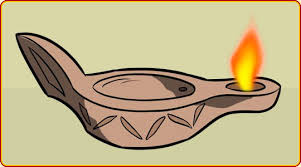






 Ministers of God have been elevated to their positions for the purpose of shepherding and leading others. Their main concern is to further God's kingdom. They must be scrupulously exact in fulfilling the commands of the Master, not substituting their own agenda for his.
Ministers of God have been elevated to their positions for the purpose of shepherding and leading others. Their main concern is to further God's kingdom. They must be scrupulously exact in fulfilling the commands of the Master, not substituting their own agenda for his.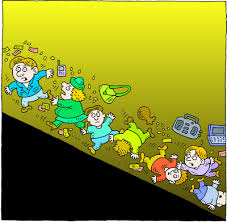
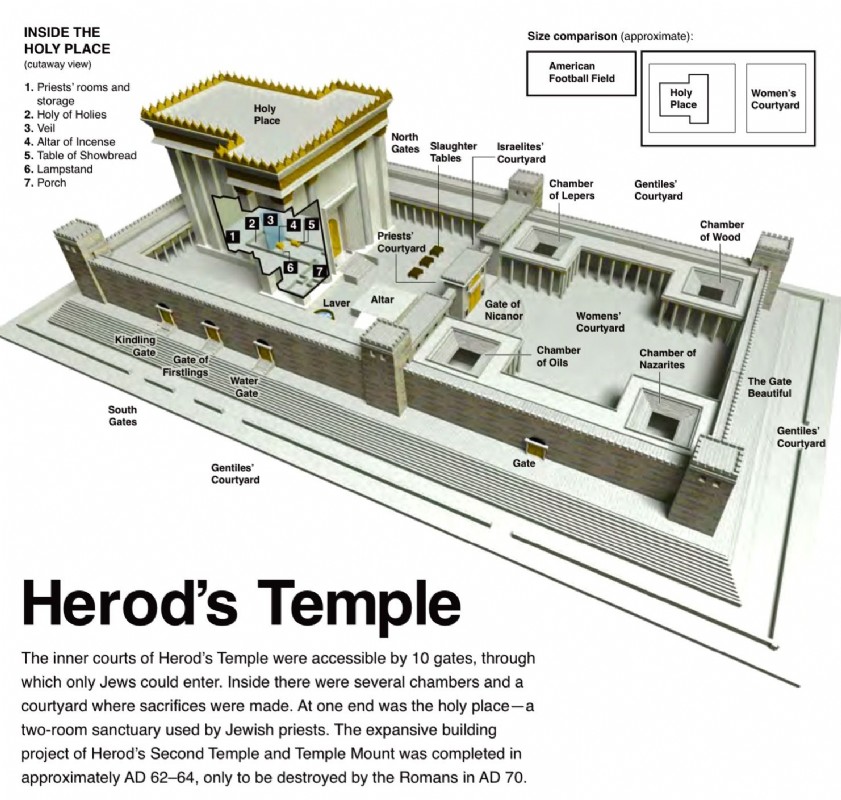 Jesus does not tell them an exact day when he will return, however, he does give them some signs to look for that will mark the end of the age. The difficulty comes when we try to define 'end of the age'.
Jesus does not tell them an exact day when he will return, however, he does give them some signs to look for that will mark the end of the age. The difficulty comes when we try to define 'end of the age'. This meant you could ascend/descend between the roof and the street without going into the house. It was also standard practice for these roofs to be built in a continuous line, so that you could pass from house to house along everyone's roof without having to descend to the street, until you came close to the city gate. If you were fleeing for your life, this would be the quickest route out of the city.
This meant you could ascend/descend between the roof and the street without going into the house. It was also standard practice for these roofs to be built in a continuous line, so that you could pass from house to house along everyone's roof without having to descend to the street, until you came close to the city gate. If you were fleeing for your life, this would be the quickest route out of the city.

 The Old Testament tells us that there was a sound of trumpets when the law was given on Mt Sinai. It was exceedingly loud and the people trembled at the scene before them. How much worse it will be at the end of the world for those who have rejected Christ. When they hear that trumpet sound, they too will tremble at the scene before them, for it will signify the time of divine justice.
The Old Testament tells us that there was a sound of trumpets when the law was given on Mt Sinai. It was exceedingly loud and the people trembled at the scene before them. How much worse it will be at the end of the world for those who have rejected Christ. When they hear that trumpet sound, they too will tremble at the scene before them, for it will signify the time of divine justice. We also cannot help but notice the parallel between the tree and the church. In winter, the tree appears lifeless and barren. Yet, when the season changes and the nourishing sap runs through the tree, it is transformed into a thriving, living thing that will bring forth fruit.
We also cannot help but notice the parallel between the tree and the church. In winter, the tree appears lifeless and barren. Yet, when the season changes and the nourishing sap runs through the tree, it is transformed into a thriving, living thing that will bring forth fruit.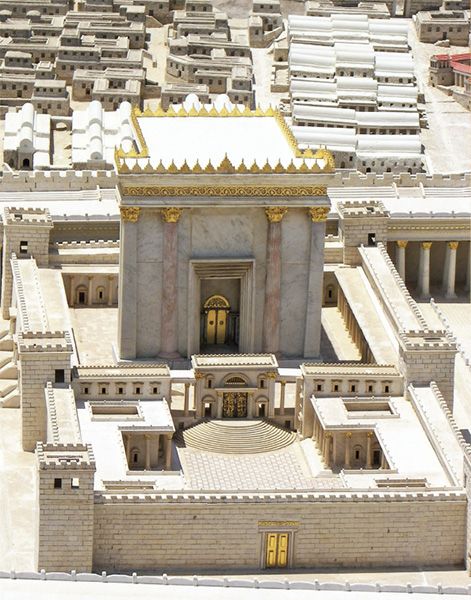




 Worse yet, this may refer to the biblical concept of brotherly love. As Christians, we are to love our fellow believers. However, persecution can cause believers to be suspicious and shy of one another. This can drive a wedge of distrust amongst God's people and as a result, our love for one another grows cold.
Worse yet, this may refer to the biblical concept of brotherly love. As Christians, we are to love our fellow believers. However, persecution can cause believers to be suspicious and shy of one another. This can drive a wedge of distrust amongst God's people and as a result, our love for one another grows cold.
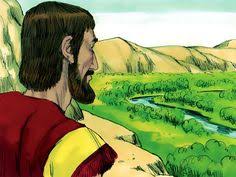
 So in this case, Jesus predicts what the religious leaders will do. They will not repent. They will continue the evil practices of their forefathers. They are the generation who will kill the Messiah, but even that will not be enough for them. They will also fiercely persecute the apostles and disciples of Jesus after he has risen. God brought judgment upon them in 70 AD, when their nation, temple and city were completely destroyed.
So in this case, Jesus predicts what the religious leaders will do. They will not repent. They will continue the evil practices of their forefathers. They are the generation who will kill the Messiah, but even that will not be enough for them. They will also fiercely persecute the apostles and disciples of Jesus after he has risen. God brought judgment upon them in 70 AD, when their nation, temple and city were completely destroyed.

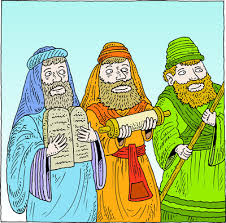 In most of the 'woes' Jesus tells the religious leaders that they are hypocrites. They have deceived themselves and others. They are wearing masks of godliness, which hide their corrupt and polluted hearts.
In most of the 'woes' Jesus tells the religious leaders that they are hypocrites. They have deceived themselves and others. They are wearing masks of godliness, which hide their corrupt and polluted hearts. What an evil and cunning practice! It becomes even more foul when we recall that God had mandated the special care and protection of widows and orphans because they were vulnerable people!
What an evil and cunning practice! It becomes even more foul when we recall that God had mandated the special care and protection of widows and orphans because they were vulnerable people! Secondly, they tried to claim that some oaths were not binding. For instance, if a man swore an oath by the temple, that was a non-binding oath. You didn't have to tell the truth or perform the action that you swore you would. (I have to wonder, what was the purpose of an oath that was not binding??)
Secondly, they tried to claim that some oaths were not binding. For instance, if a man swore an oath by the temple, that was a non-binding oath. You didn't have to tell the truth or perform the action that you swore you would. (I have to wonder, what was the purpose of an oath that was not binding??) Jesus reveals that their thinking is deluded by their greed. The thing that is most important to them is the gold or the gift, because these are the things that will go into the temple treasury to support their lifestyle or put food in their mouths.
Jesus reveals that their thinking is deluded by their greed. The thing that is most important to them is the gold or the gift, because these are the things that will go into the temple treasury to support their lifestyle or put food in their mouths. it. [I don't know about you, but that sounds like a great idea to me. However, they probably did it to be in line with Leviticus 11:23 and 11:42.]
it. [I don't know about you, but that sounds like a great idea to me. However, they probably did it to be in line with Leviticus 11:23 and 11:42.] 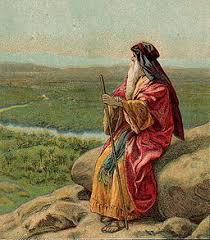
 In other words, the word of God should not be despised because of the wickedness of men. It was this same word that would soon point to salvation through Christ; so the people must continue to have great respect and belief in the scriptures, despite the corruptness of the religious leaders.
In other words, the word of God should not be despised because of the wickedness of men. It was this same word that would soon point to salvation through Christ; so the people must continue to have great respect and belief in the scriptures, despite the corruptness of the religious leaders.

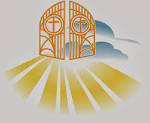

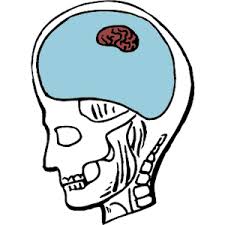

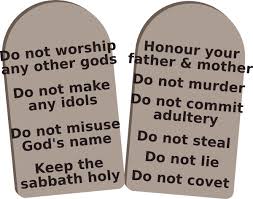 The second group consists of these: You shall not murder. You shall not commit adultery. You shall not steal. You shall not bear false witness against your neighbor. You shall not covet. Honor your father and mother.
The second group consists of these: You shall not murder. You shall not commit adultery. You shall not steal. You shall not bear false witness against your neighbor. You shall not covet. Honor your father and mother. My assumption is that all of the food would be prepared professionally and that it would taste good. I also imagine a very large amount of desserts and other goodies; things that you don't really need, but you sure enjoy! There would also be a large variety of beverages available, as well as yummy little treats at your table! I am getting hungry just thinking about it!
My assumption is that all of the food would be prepared professionally and that it would taste good. I also imagine a very large amount of desserts and other goodies; things that you don't really need, but you sure enjoy! There would also be a large variety of beverages available, as well as yummy little treats at your table! I am getting hungry just thinking about it!

